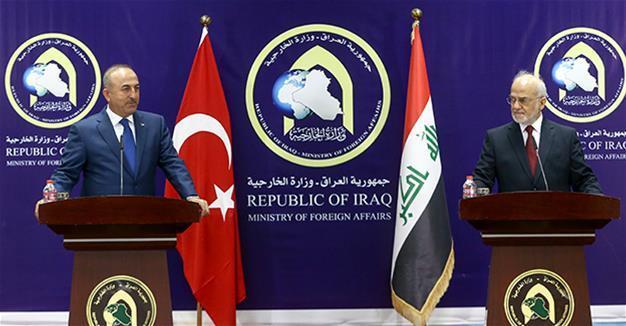Turkey tells Iraqi Kurds to cancel independence referendum
BAGHDAD / ARBIL

AA photo
Turkish Foreign Minister Mevlüt Çavuşoğlu has said Ankara expects the Iraqi Kurdistan Regional Government (KRG) to cancel an independence referendum scheduled to be held on Sept. 25.
“Our expectation from Arbil is absolutely plain and clear. It is the cancelation of this referendum decision,” Çavuşoğlu told a joint news conference with his Iraqi counterpart Ibrahim al-Jaafari in Baghdad on Aug. 23, stressing the importance of “the stability, unity and solidarity of the region.”
“Talks are ongoing between [the KRG] and Baghdad in order for their demands to be met. We feel content about this, but the stability, unity and solidarity of the region is very important. Our Kurdish brothers’ interests and future is with the unity and solidarity of Iraq. We will convey our thoughts to them today once again,” he said.
“Ankara hopes that all problems between the sides will be solved with dialogue and understanding, within the framework of Iraq’s border and territorial integrity,” Çavuşoğlu added.
He also emphasized that Turkey supports the KRG and said its rights in the Iraqi constitution should be honored.
“However, we told Arbil about the wrong steps it is taking,” Çavuşoğlu said, adding that it is also wrong to fly the KRG flag at official institutions in Kirkuk, which is against the Iraqi constitution.
“We are trying the best we can for solutions to the problems between Arbil and Baghdad. We will continue to play our role in the best and most constructive way possible if demands come from both sides,” he said.
In the joint press conference, Çavuşoğlu also said Ankara is pleased with Iraq’s successes in the struggle against the Islamic State of Iraq and the Levant (ISIL) and the recent clearance of the jihadist group from Mosul, while adding that Ankara would continue to support Iraq in its fight against ISIL.
Regarding the recently launched operation against ISIL in Tal Afar, Çavuşoğlu stressed that the Turkmen identity in the region must be protected.
“We want to improve our relations with Iraq in all areas,” he said, vowing that Ankara and Baghdad would work together to clear Iraq from the outlawed Kurdistan Workers’ Party (PKK).
“The PKK is a threat to Iraq’s territorial integrity, border unity, peace and solidarity, just like ISIL. We will work together to clear Iraq from the PKK and will give all the necessary support to the Iraqi forces,” he said.
Saying that both ISIL and the PKK are “common enemies” of Iraq and Turkey, Çavuşoğlu noted that for the stability and peace of Iraq these terrorist groups need to be removed.
“If we move with joint strategies and act together, we can save Iraq from this terror threat and terrorist groups,” he said.
A day earlier, KRG President Masoud Barzani had vowed that “the referendum will go ahead unless a stronger alternative is offered,” while adding that Arbil will continue dialogue with Baghdad “with the objective of becoming two good neighbors.”
During his meeting with U.S. Secretary of Defense James Mattis on Aug. 22, Barzani said “the referendum is a right of the people of Kurdistan according to the principles of democracy and human rights,” Rudaw reported.
He told the visiting U.S. delegation that the referendum would “in no way create problems in the war against terrorism.”
“Any request for Kurdistan to postpone the referendum should come up with an alternative, and that alternative should be stronger than the tool of the referendum,” a statement released from Barzani’s office read, adding that “the right to hold the referendum was given in the preface of the constitution of Iraq.”
Mattis, meanwhile, reiterated Washington’s concern that the referendum could destabilize the region and negatively affect the campaign against ISIL.
The United States and other Western countries fear the vote could ignite a new conflict with Baghdad and possibly neighboring countries, diverting attention from the ongoing war against ISIL in Iraq and Syria.
